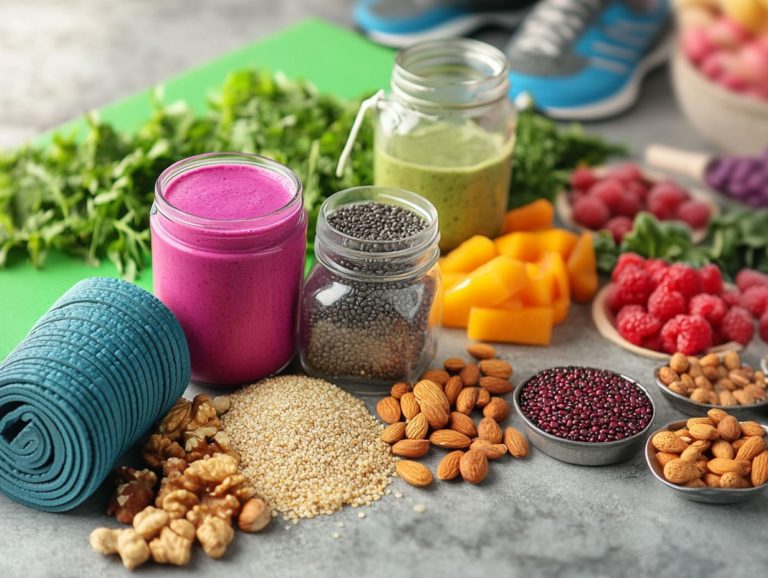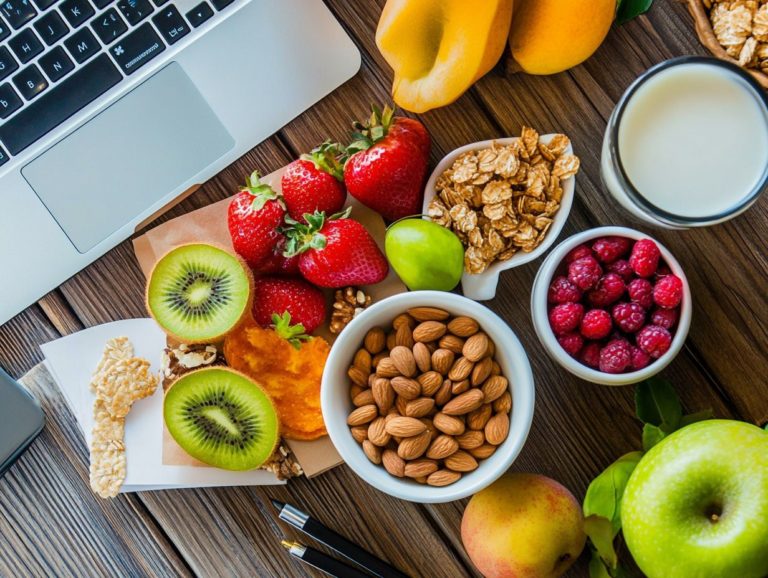Vegan Nutrition: Key Tips for Plant-Based Diets
Are you intrigued by vegan nutrition and eager to embark on a journey toward a well-rounded, plant-based diet?
This article delves into the essential facets of vegan eating, guiding you through what a vegan diet truly encompasses and highlighting important nutrients for good health.
Get ready to discover exciting plant-based protein sources! You ll also explore vitamins and minerals that deserve your attention, and uncover practical strategies for meeting your calorie requirements.
You ll also find valuable tips for meal planning, enabling you to craft delicious and nutritious vegan meals that invigorate your culinary experience.
Contents
- Key Takeaways:
- The Basics of Vegan Nutrition
- Plant-Based Protein Sources
- Vitamins and Minerals for Vegans
- Meeting Calorie Needs on a Vegan Diet
- Meal Planning for a Balanced Vegan Diet
- Frequently Asked Questions
- What are the key tips for a successful plant-based diet?
- How can I ensure I am getting enough protein on a vegan diet?
- Is it necessary to take supplements on a vegan diet?
- How can I make sure I am getting enough calcium on a vegan diet?
- Can a vegan diet meet all my nutritional needs?
- Are there any potential pitfalls to watch out for on a vegan diet?
Key Takeaways:
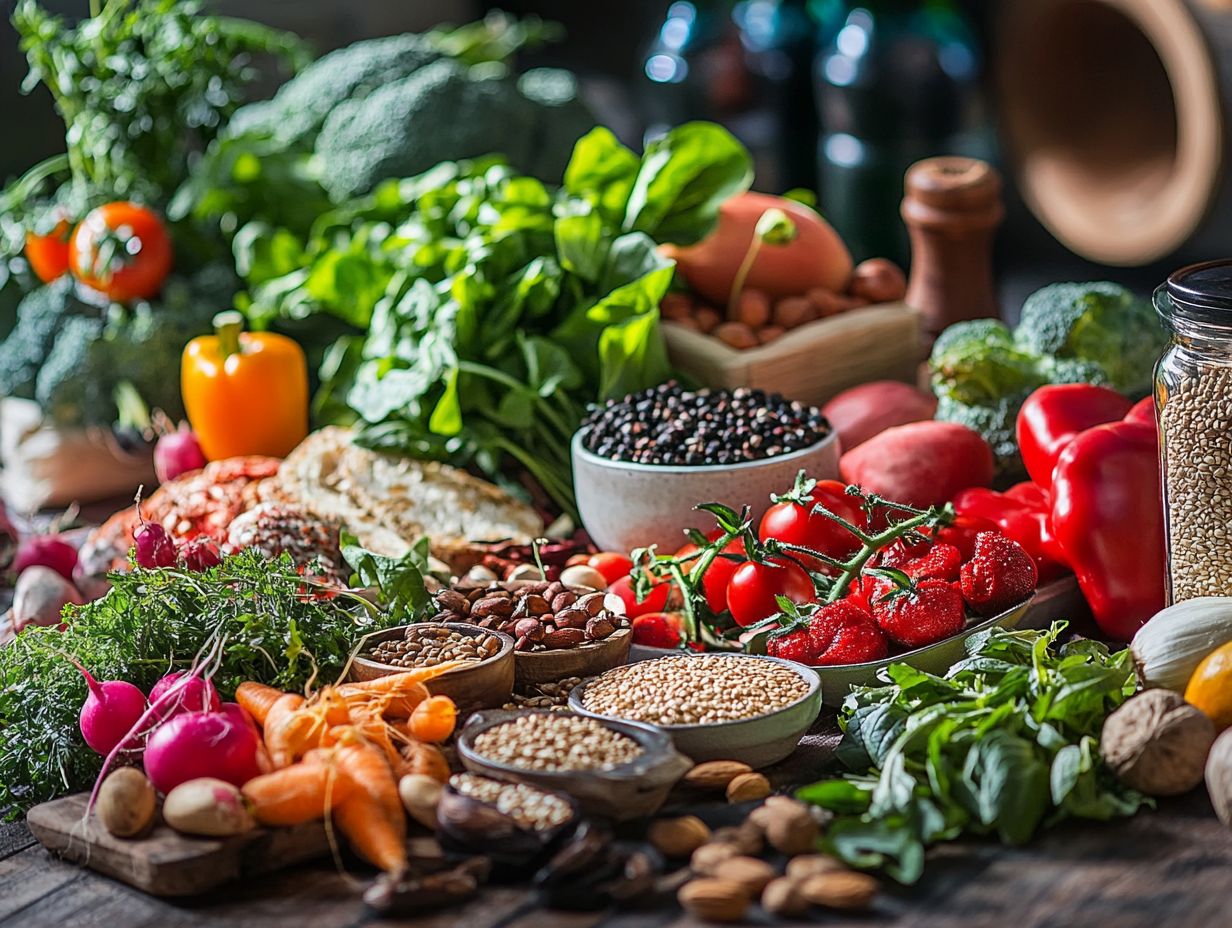
- A vegan diet excludes all animal products and requires careful attention to key nutrients such as protein, vitamins, and minerals.
- Complete proteins are proteins that contain all essential amino acids and can be obtained from various plant-based sources such as tofu, lentils, and quinoa, while incomplete proteins can be combined to form a complete protein.
- Vegans may need to supplement their diet with vitamin B12, iron, and calcium. They can incorporate nutrient-dense foods like leafy greens, fortified products (foods enhanced with vitamins and minerals), and nutritional yeast into their meals.
The Basics of Vegan Nutrition
The fundamentals of vegan nutrition entail grasping how a plant-based diet aligns with dietary guidelines while ensuring you receive all the nutrients your body needs to function well for a vibrant, healthy lifestyle.
This approach highlights the importance of incorporating whole grains, fruits, vegetables, legumes, nuts, and seeds into your meals. When thoughtfully integrated into your daily diet, these foods provide considerable health benefits, supporting your journey toward optimal well-being.
What is a Vegan Diet?
A vegan diet is a lifestyle choice that excludes all animal products, focusing solely on the bounty of plant-based foods. This encompasses a vibrant array of vegetables, fruits, grains, legumes, nuts, and seeds, all of which offer a wealth of essential nutrients.
In contrast to vegetarian diets that may still include dairy and eggs, or flexitarian diets that permit occasional meat, veganism is unyieldingly plant-based. The philosophy driving this dietary choice often emerges from ethical considerations surrounding animal welfare, environmental sustainability, and personal health.
Supporters of veganism believe that this lifestyle not only reduces your impact on the environment but also lowers health risks associated with eating too much meat, including cardiovascular disease and certain cancers.
By embracing a plant-based approach, many individuals aspire to cultivate a lifestyle that resonates with their values regarding sustainability and humane farming practices.
Key Nutrients to Focus on
Key nutrients to focus on in your vegan diet include protein sources, calcium, vitamin B12, iron, and healthy fats each vital for fulfilling your nutritional needs. Careful meal planning is essential to ensure that these crucial vitamins are well-represented in your plant-based choices.
If you re embracing a vegan lifestyle, it’s imperative to incorporate a variety of foods to prevent deficiencies while achieving a balanced diet.
Foods such as:
- Lentils
- Chickpeas
- Quinoa
are fantastic options for meeting your protein requirements, while leafy greens and fortified plant milks deliver calcium. To stave off potential vitamin B12 deficiency, consider adding fortified cereals or nutritional yeast to your meals.
Iron-rich foods like beans and dark chocolate can be absorbed more effectively when paired with vitamin C-rich options. Don t forget to include avocados and nuts to guarantee a healthy intake of fats.
Effective meal prep strategies, such as batch cooking or combining grains and proteins, can simplify your daily quest to obtain these essential nutrients.
Plant-Based Protein Sources
You ll find that plant-based protein sources are both abundant and diverse, delivering essential amino acids without the need for animal products.
Consider incorporating foods like legumes, nuts, seeds, tofu, and tempeh into your meals. These ingredients not only provide ample protein but also open the door to a multitude of cooking methods and creative meal ideas.
Complete vs. Incomplete Proteins
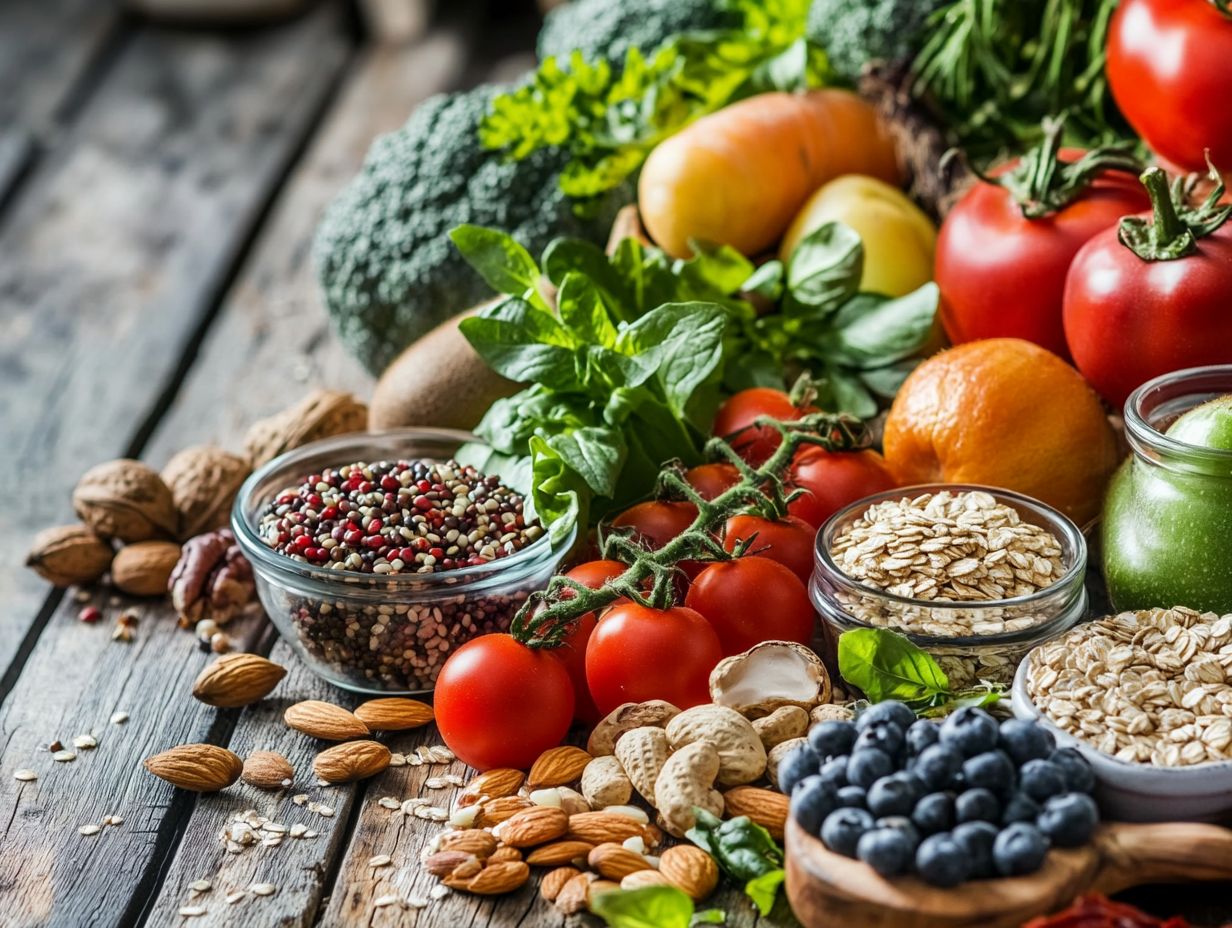
Complete proteins are essential allies in your diet because they contain all nine essential amino acids. In contrast, incomplete proteins lack one or more amino acids, which is important to understand, especially in plant-based diets. Knowing this distinction will greatly enhance your meal planning and dietary choices, particularly if you’re following vegan eating patterns.
For example, animal-based foods such as meat, eggs, and dairy are usually considered complete proteins, offering balanced amino acid profiles. On the other hand, many plant foods like beans, nuts, and grains are classified as incomplete because they miss one or more essential amino acids.
To create a complete protein profile using plant sources, combine foods like rice and beans or spread peanut butter on whole-grain bread. This method is crucial for individuals with dietary restrictions, like vegetarians and vegans, allowing them to get the nutrients they need by mixing foods thoughtfully.
Mixing different foods boosts health benefits and improves your diet quality. Get creative and explore various combinations!
Top Vegan Protein Sources
- Legumes
- Tofu
- Tempeh
- Nuts
- Seeds
These vegan protein sources offer unique nutritional profiles and versatility in your meals. By adding these foods to your meal prep, you can significantly increase the protein density of your vegan diet.
Take black beans for example. They’re not just packed with protein; they also provide fiber, making them a fantastic addition to hearty soups or colorful burrito bowls.
Then there s tofu, that delightful soybean product. With about 10 grams of protein in a half-cup serving, it’s incredibly versatile marinate it, stir-fry it, or blend it into smoothies for a creamy addition.
Tempeh is another treasure in the soy family, offering a bold nutty flavor, making it a perfect meat alternative. With around 15 grams of protein per serving, it’s great crumbled in tacos or grilled for salads.
Don’t forget about nuts and seeds, such as almonds and chia seeds. They provide healthy fats in addition to protein, making them perfect for snacks or as delightful toppings on your oatmeal.
By creatively weaving these ingredients into your meals, you can enjoy delicious, nutrient-rich dishes like quinoa and black bean salad or a savory tofu stir-fry.
Vitamins and Minerals for Vegans
Vitamins and minerals are crucial components of a vegan diet. It’s important to be aware of common deficiencies to maintain optimal health.
Key nutrients such as calcium, vitamin B12, and iron require your attention, as ensuring adequate intake from plant-based sources is vital for your well-being.
Common Deficiencies and How to Address Them
Common deficiencies in a vegan diet can include vitamin B12, calcium, and iron. It’s essential to understand how to address these gaps effectively. Strategic dietary changes and mindful meal prep can help ensure a balanced intake of these important nutrients.
Many individuals transitioning to a plant-based lifestyle might overlook these critical vitamins and minerals, potentially leading to health issues over time. For instance, you can boost your vitamin B12 levels by incorporating fortified foods like plant-based milks and cereals. To enhance your calcium intake, consider adding tofu, leafy greens, and almonds to your meals.
For iron, include lentils, chickpeas, and quinoa regularly, especially when paired with vitamin C-rich foods like bell peppers or citrus fruits for optimal absorption. Taking a daily multivitamin or specific supplements can fill any nutritional gaps, while careful meal planning will help you maintain a well-rounded diet.
Meeting Calorie Needs on a Vegan Diet
Meeting your calorie needs on a vegan diet is crucial for sustaining energy levels and promoting overall health. This requires thoughtful consideration of your food choices.
By prioritizing nutrient-dense sources, you can confidently navigate your dietary transition while safeguarding your well-being.
Strategies for Getting Enough Calories
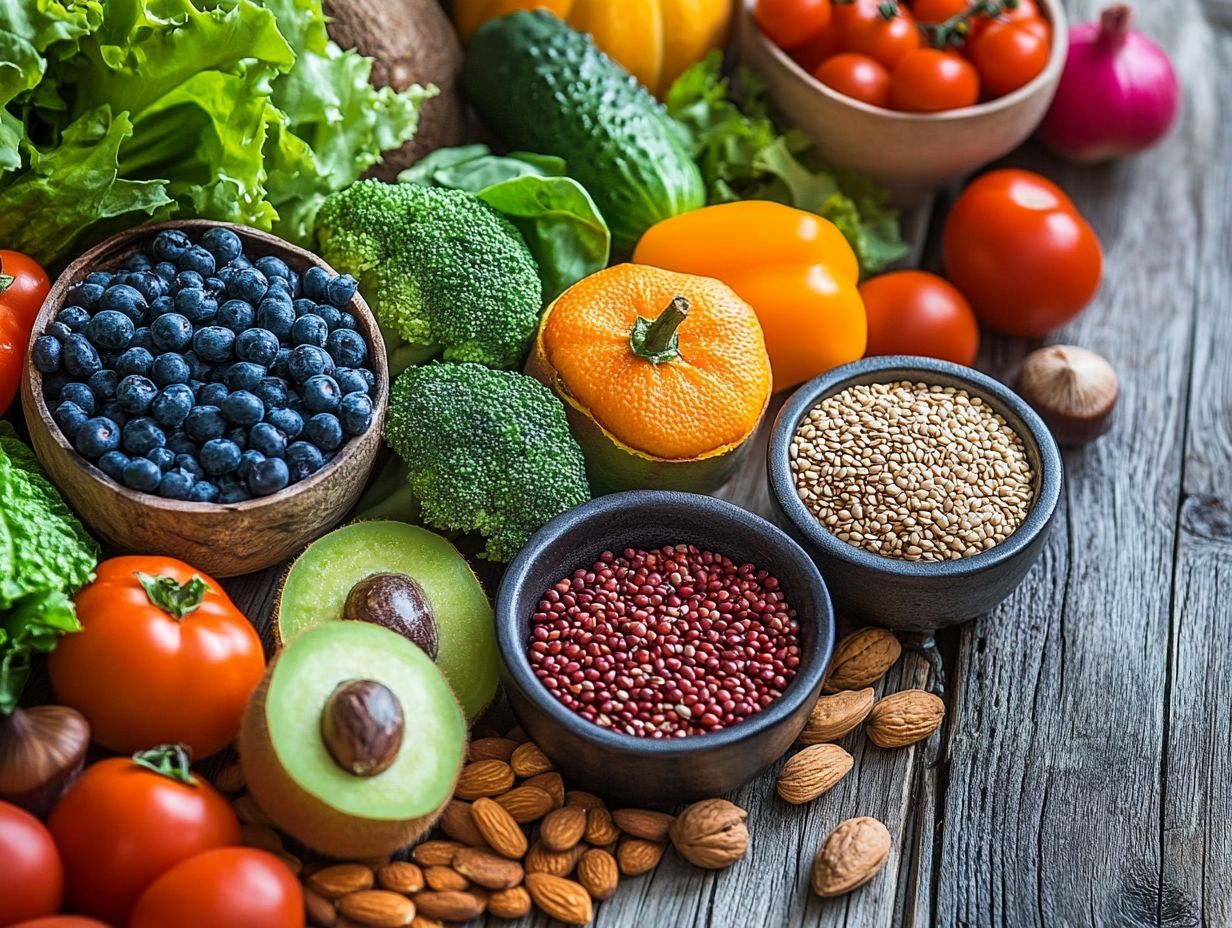
To ensure you’re getting enough calories on a vegan diet, consider incorporating calorie-dense foods like nuts, seeds, and avocados. Emphasize nutrient-rich foods to optimize your health benefits.
Effective meal prep can streamline this process. It makes it easier to maintain a balanced intake.
By planning your meals in advance, you can make choices that maximize your energy intake. This ensures you also get a variety of nutrients.
Including wholesome snacks, such as trail mix or energy bars made with dried fruits and nut butters, between meals can help you boost caloric consumption without much effort.
Healthy fats are powerful. Use sources like olive oil or coconut cream in your cooking to enhance calorie density significantly.
When you combine these strategies with creative meal ideas like lentil burgers or quinoa salads, you’ll enjoy satisfying dishes that support your active lifestyle while staying true to your vegan principles.
Meal Planning for a Balanced Vegan Diet
Planning your meals for a balanced vegan diet requires thoughtful consideration of your nutritional needs. Ensure that all food groups are represented while adhering to dietary guidelines.
This strategy not only streamlines your meal prep process but also fosters creativity in the kitchen. It allows you to explore a diverse array of recipes.
Tips and Tricks for Creating Nutritious Meals
Creating nutritious meals on a vegan diet can be remarkably straightforward when you have the right tips and tricks. Focus on incorporating a diverse array of food sources and cooking methods.
Meal prep is essential for maintaining a healthy lifestyle while keeping your meals exciting. By embracing batch cooking, you can prepare larger quantities of staple items like grains, legumes, and roasted vegetables.
These can be ready to store in the fridge or freezer for quick access throughout the week. Using seasonal ingredients elevates the flavor of your meals, saves you money, and offers the added health benefits of fresh produce.
Dive into new recipes today! Explore a world of flavors and textures to ensure your diet remains diverse.
This approach not only enhances the enjoyment of mealtime but also supports your overall well-being by providing essential nutrients.
Frequently Asked Questions
What are the key tips for a successful plant-based diet?
The key tips for a successful plant-based diet include:
- Enjoy a variety of fruits and vegetables daily.
- Add plant-based proteins like beans, lentils, and tofu.
- Choose whole grains; limit processed foods.
- Include healthy fats from avocados, nuts, and seeds.
- Consider a vitamin B12 supplement.
- Drink plenty of water to stay hydrated.
How can I ensure I am getting enough protein on a vegan diet?
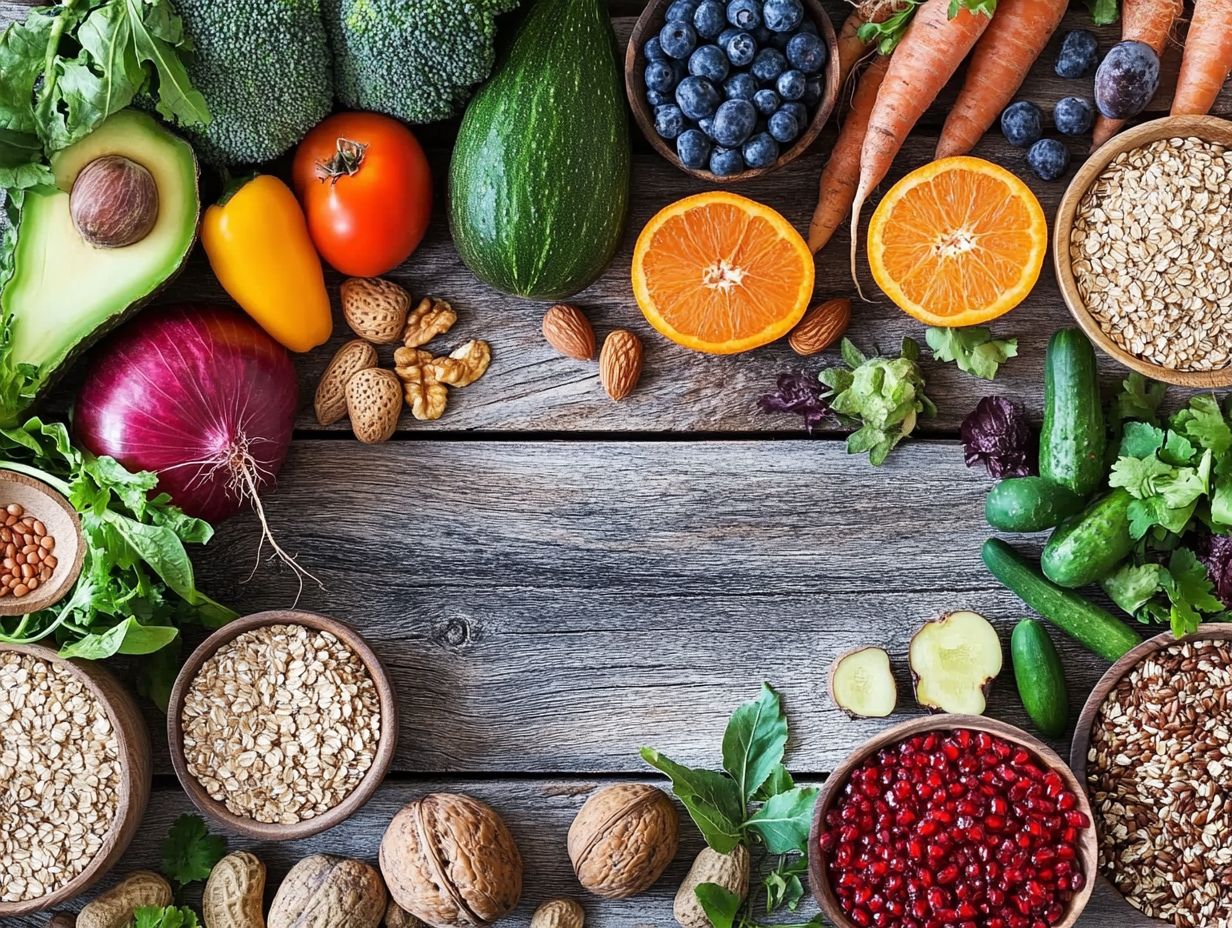
Contrary to popular belief, it is possible to get enough protein on a vegan diet. Some plant-based foods that are good sources of protein include beans, lentils, tofu, tempeh, nuts, and seeds.
It’s important to include a variety of these protein sources in your meals and snacks throughout the day.
Is it necessary to take supplements on a vegan diet?
While it is possible to get all the necessary nutrients from a well-planned vegan diet, it is recommended to take a vitamin B12 supplement. This is because B12 is primarily found in animal products and is essential for energy production and healthy nerve function.
It is also recommended to get a blood test to check for any potential nutrient deficiencies.
How can I make sure I am getting enough calcium on a vegan diet?
Dairy products are a common source of calcium, but there are plenty of plant-based sources as well. Some good options include fortified plant milks, calcium-set tofu, leafy greens like kale and collard greens, and almonds.
It’s also important to ensure you are getting enough vitamin D, which helps with calcium absorption.
Start your journey to a healthier vegan lifestyle today!
Can a vegan diet meet all my nutritional needs?
Yes, a well-planned vegan diet can meet your nutritional needs.
Focus on a variety of foods and nutrients, including protein, iron, calcium, and vitamins B12 and D.
Planning meals and snacks with different plant-based foods will help you achieve this.
Are there any potential pitfalls to watch out for on a vegan diet?
Watch out for certain pitfalls on a vegan diet.
These include not getting enough variety or essential nutrients and relying too much on processed vegan foods.
Make eating a colorful variety of plant-based foods a fun adventure in your meal planning!
Make sure to eat a wide range of plant-based foods and consider supplements for any lacking nutrients.


